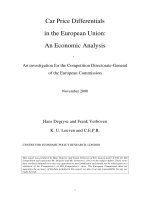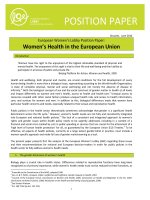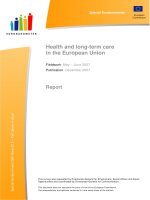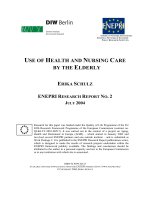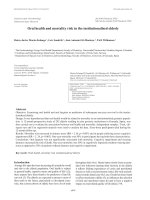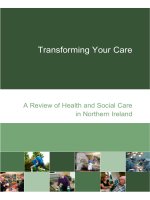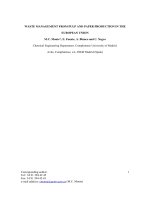Health and long-term care in the European Union pot
Bạn đang xem bản rút gọn của tài liệu. Xem và tải ngay bản đầy đủ của tài liệu tại đây (10.68 MB, 247 trang )
Special Eurobarometer
Health and long-term care
in the European Union
Fieldwork: May – June 2007
Publication: December 2007
Special Eurobarometer 283/ Wave 67.3 – TNS Opinion & Social
This survey was requested by Directorate-General for Employment, Social Affairs and Equal
Opportunities and coordinated by Directorate-General for Communication.
This document does not represent the point of view of the European Commission.
The interpretations and opinions contained in it are solely those of the authors.
European
Commission
Report
Special EUROBAROMETER 283 “Health and Long-Term Care”
- 1 -
Table of contents
INTRODUCTION 3
1. THE HEALTH OF EUROPEANS 5
1.1 Healthy living 5
1.2 The consequences of unhealthy behaviour and situations 11
1.3 Health limitations 14
1.4 Becoming dependent upon the help of others 17
1.5 Preparations for the future 22
2. HEALTH CARE IN EUROPE 25
2.1 Hospitals 25
2.2 Dental care 33
2.3 Medical or surgical specialists 42
2.4 Family doctors 48
2.5 Care services for dependent people 54
2.6 Nursing homes 60
3. ATTITUDES TO CARE OF ELDERLY AND DEPENDENT PEOPLE 66
3.1 Best care option for elderly parents 66
3.2 Attitudes regarding care for the elderly 68
3.3 Attitudes concerning the situation of dependent elderly
people……… 72
Special EUROBAROMETER 283 “Health and Long-Term Care”
- 2 -
4. PROVIDING LONG-TERM CARE 78
4.1 Experience with long-term health care 78
4.2 Paying for the long-term care of a parent 85
5. RECEIVING LONG-TERM CARE 91
5.1 Likelihood of receiving appropriate care in the future 91
5.2 Expected and preferred form of long-term care 95
5.3 Financing long-term care 100
6. MALTREATMENT OF DEPENDENT ELDERLY PEOPLE 107
6.1 Occurrence of poor treatment, neglect and abuse 107
6.2 Forms of maltreatment faced by dependent elderly people109
6.3 Perceived ‘offenders’ 112
6.4 Preventing maltreatment 114
CONCLUSION 117
ANNEXES
Respondents’ sociodemographic profile
Technical note
Questionnaire
Data tables
Special EUROBAROMETER 283 “Health and Long-Term Care”
- 3 -
INTRODUCTION
Confronted with rising long-term care needs due to an increasingly ageing
population, the European Union is supporting the Member States in their efforts to
improve health and long-term care in Europe. In 2002, the Barcelona European
Council recognised three guiding principles for the reform of health care systems:
accessibility for all, high quality care and long-term financial sustainability. It is in
this context that the Directorate-General Employment of the European Commission
commissioned a survey that examines public opinion about health care across
Europe, focussing specifically on long-term care and care of the elderly.
Between the 25
th
of May and the 30
th
of June 2007, TNS Opinion & Social interviewed
28,660 Europeans aged 15 and over living in the 27 European Union Member States
and the two candidate countries (Croatia and Turkey). The methodology used is that
of the Standard Eurobarometer surveys of the Directorate-General Communication
(“Public Opinion and Media Monitoring” Unit). A technical note concerning the
interviews, carried out by the institutes of the TNS Opinion & Social network, is
annexed to this report. This note specifies the interview method used, as well as the
confidence intervals
1
.
This report studies successively the following issues covered by the survey.
♦ First of all, we focus on the lifestyle of Europeans, their health-limitations and
their views about becoming dependent upon the help of others. In chapter
two we examine the public’s assessment of the health-care system in general
and the care of dependent people specifically by looking at quality,
availability, accessibility and affordability of health care services. We
furthermore analyse the extent to which people have had to do without care
because of availability, accessibility or affordability problems.
♦ The second part of the report focuses on attitudes to care of elderly and
dependent people: how people want their elderly parents to be looked after,
how should the care of elderly and dependent people be financed and how
well elderly and dependent people are perceived to be looked after.
♦ In the final part we focus specifically on long-term care and the care of the
elderly. We firstly examine Europeans’ views about the provision of long term
care: the appropriateness and costs and to what extent they themselves have
been involved in providing care. We then look at people’s views about
receiving care: the perceived likelihood that people will receive appropriate
care in the future, how they expect and prefer to be taken care of should the
need arise and how they think they will finance their future long-term care. In
the last chapter, we look at the extent to which abuse of elderly dependent
people is perceived to be taking place, what forms of abuse this vulnerable
group is subjected to and who the perpetrators are perceived to be.
1
The results tables are included in the annex. The totals indicated may show a one point difference with
the sum of the individual units. It should also be noted that the total of the percentages in the tables of
this report may exceed 100% when the respondent has the possibility to give several answers to the same
question.
Special EUROBAROMETER 283 “Health and Long-Term Care”
- 4 -
In this report the countries are represented by their official abbreviations. Other
abbreviations used in this report are:
ABBREVIATIONS
EU27 European Union - 27 Member States
EU15 European Union - 15 Member States prior to 1
st
May
2004
NMS12 New Member States – 12 Member States which joined
the EU after 1
st
May 2004
DK Don’t know
BE Belgium
BG Bulgaria
CZ Czech Republic
DK Denmark
D-E East Germany
DE Germany
D-W West Germany
EE Estonia
EL Greece
ES Spain
FR France
IE Ireland
IT Italy
CY Republic of Cyprus
LT Lithuania
LV Latvia
LU Luxembourg
HU Hungary
MT Malta
NL The Netherlands
AT Austria
PL Poland
PT Portugal
RO Romania
SI Slovenia
SK Slovakia
FI Finland
SE Sweden
UK The United Kingdom
HR Croatia
TR Turkey
TEA:
Terminal Education Age, meaning age at which the
respondent left full-time education
Readers are reminded that survey results are estimations, the accuracy of which
rests upon the sample size and upon the observed percentages.
Special EUROBAROMETER 283 “Health and Long-Term Care”
- 5 -
1. THE HEALTH OF EUROPEANS
We begin this report with an examination of the state of health of Europeans living in
the European Union, Croatia and Turkey. We will look at both healthy and unhealthy
living habits as well as the extent and nature of the limitations people face because
of their health and their self-perceived life expectancy. At the end of this chapter, we
look at the extent to which people believe they may become dependent on others
because of their health and how they feel about this. The results will be analysed on
the basis of respondents’ age, sex, gender, education and occupational status and by
their country of residence.
1.1 Healthy living
Looking at the lifestyle of European Union citizens, the survey shows that, on
average, three out of ten Europeans seem to lead a healthy life. These are people
who are not affected by any of the nine “health vices and hazards” listed in the graph
below
2
.
QA24 Could you please tell me if any of the following apply to you?
(MULTIPLE ANSWERS POSSIBLE) - % EU27
32%
6%
7%
8%
10%
14%
17%
20%
24%
30%
1%
DK
None of the above (SPONTANEOUS)
You live or work in an environment that is heavily polluted
You tend to drink a bit too much alcohol
You live in a noisy environment
You suffer from stress in your personal relations
You do not eat very healthy food
You suffer from stress at work
You are overweight
You never do any exercise, or do so very rarely
You smoke
Smoking remains the biggest vice and 30% of Europeans smoke. Weight related
problems are also widespread: 24% of respondents say they never or very rarely
exercise, 20% say they are overweight and 14% say they do not eat very healthy
food. Then there is stress: 17% of Europeans suffer stress at work and 10% suffer
from it in their personal relations.
2
QA24 Could you please tell me if any of the following apply to you? (MULTIPLE ANSWERS POSSIBLE)
Special EUROBAROMETER 283 “Health and Long-Term Care”
- 6 -
However these European averages conceal large variations depending on people’s
demographic characteristics and their country of residence. Firstly, when it comes to
differences based on gender, age, education
3
and occupational status, the most
relevant variations to report are as follows
4
:
• Gender: men are more likely to report that they smoke and experience stress
from work while women are more likely to report that they are overweight
and do not exercise. On the whole, however, women abstain from unhealthy
behaviour more so than men (34% vs. 29%);
• Age: people aged 55 and over are considerably less likely than the average
to report that they smoke. Being overweight and lacking exercise affects
people aged 40 and over the most. Unhealthy eating habits are most
widespread among the youngest respondents. Overall, respondents aged 55
and over tend to have the healthiest lifestyles (39% refrain from unhealthy
behaviour);
• Education: Students report the healthiest behaviour as they are the least
likely to be affected by the nine “vices and hazards” (43%);
• Occupational status: More than a half of unemployed Europeans report that
they smoke (53%). This group of Europeans also more frequently reports
suffering from stress in their personal relations (19%) and is most likely to
live in a noisy environment (12%). These findings suggest that being
unemployed presents a health-risk. High levels of stress at work are reported
by managers (39%) while retired people most often report being overweight
(27%). Overall, however, retired Europeans report a healthier life-style than
average (41% abstain from any unhealthy behaviour).
4
In the table, groups that deviate by 3 percentage points or more from other groups in their category are
highlighted in red (= less healthy) or green (= healthier).
You smoke
You are
overweight
You never
do any
exercise,
or do so
very rarely
You do not
eat very
healthy
food
You tend
to drink a
bit too
much
alcohol
You live in a
noisy
environment
You live or
work in an
environment
that is heavily
polluted
You
suffer
from
stress at
work
You suffer
from stress
in your
personal
relations
None of
the above
(SPONT.)
DK
EU27
30% 20% 24% 14% 7% 8% 6% 17% 10% 32% 1%
Sex
Male 35% 19% 22% 16% 12% 8% 7% 19% 7% 29% 1%
Female 24% 22% 25% 12% 3% 7% 5% 15% 13% 34% 1%
Age
15-24 34% 9% 17% 22% 10% 10% 6% 11% 11% 37% 1%
25-39 39% 15% 23% 16% 8% 9% 7% 25% 11% 26% 1%
40-54 34% 25% 26% 14% 9% 8% 8% 26% 12% 25% 1%
55 + 17% 26% 26% 8% 4% 6% 3% 5% 7% 39% 1%
Education
(
End of
)
15 25% 23% 27% 10% 6% 6% 4% 8% 9% 36% 1%
16-19 36% 22% 25% 16% 8% 8% 7% 18% 10% 28% 1%
20+ 28% 20% 23% 12% 8% 8% 6% 28% 10% 29% 1%
Still Studying 25% 8% 15% 20% 9% 11% 5% 8% 11% 43% 1%
Res
p
ondent occu
p
ation scale
Self- em
p
lo
y
ed 37% 18% 22% 13% 10% 8% 8% 28% 10% 27% 1%
Mana
g
ers 21% 19% 20% 12% 10% 6% 5% 39% 8% 30% 1%
Other white collars 33% 21% 27% 17% 8% 7% 7% 29% 9% 26% 1%
Manual workers 42% 19% 23% 17% 9% 9% 10% 27% 9% 24% 1%
House persons 23% 20% 28% 9% 2% 7% 3% 2% 14% 36% 2%
Unemployed 53% 24% 26% 19% 12% 12% 6% 5% 19% 22% 1%
Retired 18% 27% 26% 8% 5% 5% 3% 1% 8% 41% 1%
Students 25% 8% 15% 20% 9% 11% 5% 8% 11% 43% 1%
QA24 Could you please tell me if any of the following apply to you? (MULTIPLE ANSWERS POSSIBLE)
Special EUROBAROMETER 283 “Health and Long-Term Care”
- 7 -
The European Union average also conceals large variations between Member States
in the extent to which respondents report unhealthy behaviour. If we take the top
three reported bad habits firstly we find that smoking is most widespread in Greece
(44%) and Latvia (41%) and least widespread in Sweden (19%). Yet, despite these
extremes, in most surveyed nations the reported smoking rates range from between
a quarter to a third of respondents.
Special EUROBAROMETER 283 “Health and Long-Term Care”
- 8 -
When it comes to exercise, the country by country variation is greater. In Lithuania,
more than a half of respondents report that they never or very rarely exercise
(51%). Similarly high levels report the same in Turkey (48%). At the other extreme,
we find that in Germany only 14% of people report that they never or only very
rarely exercise, followed by Ireland and Finland (both 15%).
Special EUROBAROMETER 283 “Health and Long-Term Care”
- 9 -
While on average one European in five say they are overweight, in Malta this applies
to over a third of people (34%). After Malta, Sweden (29%) and the United Kingdom
(28%) have the highest proportions of respondents who report that they are
overweight. Conversely, very few people in Romania (11%), Bulgaria (13%) and
Ireland (14%) report being overweight.
The table on the next page shows the country results for each of the nine health
vices and hazards. For each, the country with the lowest reporting percentage is
highlighted in green and the country with the highest is highlighted in red.
Special EUROBAROMETER 283 “Health and Long-Term Care”
- 10 -
QA24 Could you please tell me if any of the following apply to you? (MULTIPLE ANSWERS POSSIBLE)
You
smoke
You are
overweight
You
never do
any
exercise,
or do so
very
rarely
You do
not eat
very
healthy
food
You
tend to
drink a
bit too
much
alcohol
You live in a
noisy
environment
You live or
work in an
environment
that is
heavily
polluted
You
suffer
from
stress
at
work
You
suffer
from
stress in
your
personal
relations
None of
the
above
(SPONT.)
DK
EU27
30% 20% 24% 14% 7% 8% 6% 17% 10% 32% 1%
BE
27% 25% 29% 10% 8% 10% 7% 22% 11% 24% 1%
BG
37% 13% 38% 42% 7% 13% 8% 11% 7% 24% 2%
CZ
32% 21% 40% 37% 4% 7% 6% 15% 7% 23% 0%
DK
31% 26% 23% 12% 10% 9% 5% 19% 8% 28% 0%
DE
28% 21% 14% 10% 7% 7% 4% 19% 9% 37% 1%
EE
34% 27% 34% 26% 6% 11% 11% 19% 17% 16% 7%
EL
44% 16% 37% 21% 10% 18% 10% 22% 20% 22% -
ES
31% 15% 28% 7% 6% 8% 5% 12% 6% 37% 1%
FR
33% 20% 23% 10% 7% 9% 9% 18% 10% 30% 0%
IE
30% 14% 15% 13% 14% 3% 3% 11% 14% 40% 1%
IT
25% 17% 24% 8% 3% 5% 2% 10% 7% 40% 2%
CY
29% 17% 37% 28% 5% 14% 6% 26% 33% 19% -
LV
41% 26% 31% 32% 12% 16% 15% 27% 13% 14% 0%
LT
31% 26% 51% 45% 11% 13% 14% 23% 12% 12% 1%
LU
23% 25% 33% 8% 6% 13% 7% 26% 8% 27% 1%
HU
34% 21% 25% 22% 6% 9% 8% 13% 9% 26% -
MT
22% 34% 33% 10% 7% 10% 13% 13% 7% 28% 0%
NL
24% 26% 28% 7% 7% 5% 8% 16% 7% 31% 0%
AT
39% 24% 19% 23% 15% 8% 5% 24% 8% 27% 1%
PL
33% 22% 25% 20% 5% 9% 7% 20% 18% 25% 2%
PT
21% 17% 25% 9% 3% 4% 4% 14% 6% 45% 1%
RO
29% 11% 33% 25% 6% 8% 7% 14% 8% 32% 5%
SI
28% 23% 16% 16% 5% 10% 6% 22% 12% 31% 0%
SK
28% 23% 41% 33% 7% 12% 8% 24% 13% 21% 0%
FI
23% 27% 15% 18% 10% 3% 1% 19% 7% 33% 0%
SE
19% 29% 29% 16% 6% 4% 5% 34% 13% 24% 1%
UK
30% 28% 18% 11% 15% 7% 6% 15% 11% 28% 0%
HR
30% 24% 39% 19% 8% 10% 6% 18% 13% 24% 1%
TR
37% 20% 48% 34% 9% 35% 31% 22% 31% 12% 1%
Special EUROBAROMETER 283 “Health and Long-Term Care”
- 11 -
1.2 The consequences of unhealthy behaviour and situations
European citizens are aware of the consequences of their behaviour or living
situations for their health
5
. Two out of five of those respondents who suffer from at
least one of the nine “health vices and hazards” indicate that they believe their life
could be prolonged by several years if they avoided some of their health vices (40%)
and only one European in five believes this would have no effect on his or her life
expectancy (19%).
QA25 By how much, if at all, do you think that avoiding some of the
situations or behaviours you have just described, would prolong your life
expectancy? - % EU27
DK
21%
Few months
5%
Several years
40%
Not at all
19%
A year or two
15%
BASE: If any of the situations in QA24 apply
People’s views vary depending on the age at which they completed their full-time
education.
QA25 By how much, if at all, do you think that avoiding some of the situations or behaviours you have just described,
would prolong your life expectancy?
BASE: If any of the situations in QA24 apply
Several years A year or two Few months Not at all DK
EU27 40% 15% 5% 19% 21%
Education (End of)
15 35% 13% 4% 21% 27%
16-19 42% 15% 4% 18% 21%
20+ 43% 16% 5% 19% 17%
Still Studying 40% 20% 7% 17% 16%
5
QA25 By how much, if at all, do you think that avoiding some of the situations or behaviours you have
just described, would prolong your life expectancy?
Special EUROBAROMETER 283 “Health and Long-Term Care”
- 12 -
People who left full-time education aged 15 or younger are significantly less likely to
feel that avoiding some of the situations or behaviours would prolong their life
expectancy.
The country results indicate that people in Greece are most inclined to feel that
avoiding some of their situations or behaviours would prolong their life by several
years (55%), followed by people in Cyprus (52%) and Poland (50%).
QA25 By how much, if at all, do you think that avoiding some of the situations or behaviours you have just described, would
prolong your life expectancy?
BASE: If any of the situations in QA24 apply
Several years A year or two Few months Not at all DK
EU27
40% 15% 5% 19% 21%
BE
39% 18% 7% 27% 9%
BG
33% 12% 2% 19% 34%
CZ
39% 16% 5% 23% 17%
DK
39% 22% 5% 24% 10%
DE
29% 16% 6% 26% 23%
EE
47% 17% 2% 19% 15%
EL
55% 17% 5% 18% 5%
ES
30% 10% 3% 19% 38%
FR
49% 9% 4% 18% 20%
IE
46% 19% 1% 13% 21%
IT
41% 13% 4% 12% 30%
CY
52% 10% 1% 13% 24%
LV
40% 10% 3% 35% 12%
LT
46% 14% 5% 20% 15%
LU
29% 9% 4% 36% 22%
HU
39% 22% 6% 17% 16%
MT
27% 19% 10% 17% 27%
NL
35% 14% 6% 30% 15%
AT
20% 22% 12% 20% 26%
PL
50% 10% 4% 16% 20%
PT
44% 14% 3% 13% 26%
RO
46% 13% 3% 5% 33%
SI
31% 18% 9% 26% 16%
SK
40% 15% 7% 24% 14%
FI
36% 33% 7% 18% 6%
SE
35% 25% 6% 25% 9%
UK
47% 21% 3% 19% 10%
HR
37% 13% 7% 30% 13%
TR
47% 11% 3% 16% 23%
Special EUROBAROMETER 283 “Health and Long-Term Care”
- 13 -
People’s views also vary significantly depending on the type of behaviour or situation
they have reported. Europeans who live or work in a polluted environment most feel
that their life would be prolonged if they avoided this situation with 55% saying that
it would be prolonged by several years. Although people have high expectations
about their life prolongation for situations which are difficult to control, when it
comes to their own bad habits such as smoking, eating unhealthy and lack of
exercise they are somewhat less inclined to believe that avoiding these will extend
their life. Less than half of all smokers believe that quitting will prolong their life by
several years (45%).
A general examination of people’s self-perceived life expectancy in the group of
those aged 54 or less, also, reveals some level of awareness of the potential effect of
these bad behaviours or situations
6
. As the table below shows, people for whom
these behaviours or situations apply tend to have lower expectations regarding the
length of their lives compared to the average. This is particularly true for people who
say they drink too much alcohol.
6
QA26 Thinking about yourself personally, up to which age do you expect to live?
are in a
polluted
environment
suffer from
stress in
personal
relations
suffer from
stress at work
live in noisy
environment
drink too
much alcohol
smoke
are
overweight
eat unhealthy lack exercise
Several years 40% 55% 52% 49% 46% 45% 45% 44% 42% 40%
A year or two 15% 13% 11% 15% 14% 19% 14% 15% 18% 14%
Few months 5% 3% 4% 4% 4% 5% 4% 4% 6% 4%
Not at all 19% 14% 14% 14% 18% 19% 17% 18% 16% 20%
DK 21% 14% 19% 17% 18% 13% 21% 20% 17% 22%
All
respondents
QA25 (By how much, if at all, do you think that avoiding some of the situations or behaviours you have just described, would prolong your life expectancy?) by behaviour/situation (EU27)
Life will be
prolonged by:
Respondents who …
are in a
polluted
environment
suffer from
stress in
personal
relations
suffer from
stress at work
live in noisy
environment
drink too
much alcohol
smoke
are
overweight
eat
unhealthy
lack
exercise
59 or younger 2% 2% 4% 1% 2% 4% 2% 2% 3% 2%
60-69 6% 9% 10% 7% 12% 10% 10% 9% 11% 8%
70-79 21% 26% 24% 25% 24% 31% 25% 25% 26% 23%
80-89 30% 30% 30% 33% 31% 26% 25% 31% 26% 29%
90 or older 16% 14% 12% 14% 13% 12% 13% 13% 9% 12%
For ever 1% 2% 2% 1% 1% 2% 1% 1% 1% 1%
Refusal 2% 1% 1% 2% 1% 1% 2% 1% 2% 2%
DK 23% 16% 16% 17% 17% 13% 22% 17% 22% 23%
QA26 Life expectancy among respondents aged 54 or younger by behaviour/situation (EU27)
Respondents who …
Perceived life
expectancy
EU27
Special EUROBAROMETER 283 “Health and Long-Term Care”
- 14 -
1.3 Health limitations
On average, close to a quarter of Europeans have been somewhat (17%) or severely
(6%) limited during at least the past six months in carrying out activities people
normally do because of a physical or mental health condition
7
.
QA1 To what extent, if at all, have you been limited, for at
least the past six months, in activities people normally do,
because of a physical or mental health condition? Would you
say you have been…? - % EU27
Severely limited
6%
Not at all limited
76%
DK
1%
Somewhat
limited
17%
Older people in particular are limited in their activities because of a physical or
mental health condition. Of the respondents aged 85 and over, only a quarter have
not been limited at all in their activities for at least the past six months.
QA1 To what extent, if at all, have you been limited, for at least the past six months, in activities people
normally do, because of a physical or mental health condition? Would you say you have been…?
Severely limited Somewhat limited Not at all limited
EU27 6% 17% 76%
Age
<55 3% 11% 85%
55-64 9% 23% 68%
65-74 3% 31% 59%
75-84 16% 41% 43%
85+ 29% 45% 25%
7
QA1 To what extent, if at all, have you been limited, for at least the past six months, in activities people
normally do, because of a physical or mental health condition? Would you say you have been…?
Special EUROBAROMETER 283 “Health and Long-Term Care”
- 15 -
The extent to which people perceive themselves to be limited by a physical or mental
condition is also influenced by the norms, expectations and values of their country.
Despite relatively similar age patterns among the populations of the European Union
and the two candidate countries, large differences in people’s answers are noted
from country to country
8
.
The proportion of people who feel severely limited ranges from 2% in Italy to 13% in
Croatia and the proportion of people feeling somewhat limited ranges from 10% in
Greece, Cyprus and Ireland to 28% in Finland. Overall, respondents in Finland most
often report having been limited in their activities (34%), followed by respondents in
Estonia (32%) and Slovakia (31%). The Irish (13%) least frequently report that they
have been limited due to a physical or mental condition (13%), followed by
respondents in Italy (16%), Cyprus and Luxembourg (both 17%).
8
The weighted average age of the respondents ranges from 37 in Turkey to 48 in Germany. Furthermore,
there is no relationship between any differences in opinion and country by country variations in the
average age.
Special EUROBAROMETER 283 “Health and Long-Term Care”
- 16 -
On average, very few Europeans experience significant difficulties in carrying out
household or everyday personal care activities because of a physical or mental
condition (81%)
9
.
QA2 Tasks found difficult to carry out due to a physical or mental condition
MULTIPLE ANSWERS POSSIBLE - % EU27
1%
81%
1%
1%
1%
1%
3%
3%
3%
3%
4%
4%
4%
7%
13%
DK
No difficulty with any of the above (SPONTANEOUS)
Feeding yourself
Using toilet
Using telephone
Managing medication
Taking care of finances and everyday administrative
tasks
Dressing and undressing
Bathing or showering
Moving around at home
Cooking\ preparing meals
Light housework
Getting in and out of a bed or chair
Shopping
Occasional heavy housework
Again, this general observation conceals the difficulties faced by older Europeans.
9
QA2 Now I am going to read you a list of some household activities and everyday personal care activities.
Not counting any temporary problems you may be having, do you usually experience significant difficulty
doing any of the following by yourself because of your physical or mental health condition? Please tell me
any that apply. (MULTIPLE ANSWERS POSSIBLE).
TASKS EU27 Aged 54 < Aged 55-64 Aged 65-74 Aged 75-84 Aged 85 >
Occasional heavy housework 13% 7% 18% 25% 40% 55%
Shopping 7% 4% 9% 12% 22% 35%
Cooking\ preparing meals 4% 2% 5% 4% 9% 20%
Getting in and out of a bed or chair 4% 2% 6% 6% 8% 14%
Light housework 4% 2% 5% 5% 12% 21%
Bathing or showering 3% 1% 5% 5% 9% 15%
Taking care of finances and everyday administrative tasks 3% 2% 4% 4% 8% 13%
Moving around at home 3% 2% 4% 4% 6% 15%
Dressing and undressing 3% 1% 4% 5% 5% 10%
Using toilet 1% 1% 2% 1% 3% 5%
Managing medication 1% 1% 2% 2% 3% 6%
Feeding yourself 1% 1% 2% 1% 2% 4%
Using telephone 1% 1% 2% 1% 2% 6%
No difficulty with any of the above (SPONTANEOUS) 81% 89% 75% 66% 49% 36%
QA2 Tasks found difficult to carry out due to a physical or mental condition by age
Special EUROBAROMETER 283 “Health and Long-Term Care”
- 17 -
1.4 Becoming dependent upon the help of others
Next we look at people’s views about becoming dependent upon the help of others.
Europeans are divided in their opinion that becoming dependent because of a
physical or mental health condition will happen to them. For 13% of respondents it is
seen as an almost inevitable fact of life and a further 32% think it is likely to happen
to them. An only slightly smaller proportion of respondents considers the possibility
to be unlikely (29%) or is certain that it will not happen to them (9%). One
respondent in seven lacks an opinion (15%). A small fraction of respondents
indicated that they are currently dependent (2%)
10
.
QA17 Do you expect that at some stage during your life, you will, for
a prolonged period of time, become dependent upon the help of
others because of your physical or mental health condition?
-
% EU27
Currently
dependent
2%
DK
15%
Unlikely, but you
would not exclude
the possibility
29%
Almost inevitable
13%
Almost certain you
will not become
dependent
9%
Likely
32%
10
QA17 Do you expect that at some stage during your life, you will, for a prolonged period of time,
become dependent upon the help of others because of your physical or mental health condition?
Special EUROBAROMETER 283 “Health and Long-Term Care”
- 18 -
As to be expected, the perceived likelihood of becoming dependent increases with
age: only 7% of people aged 15 to 24 regard it as an inevitable fact.
QA17 Do you expect that at some stage during your life, you will, for a prolonged period of time, become dependent
upon the help of others because of your physical or mental health condition?
You think this is
almost inevitable
You think this is
likely
You think this is
unlikely, but you
would not exclude
the possibility
You are almost
certain that you will
not become
dependent
DK
EU27 13% 32% 29% 9% 15%
Age
15-24 7% 27% 30% 16% 19%
25-39 9% 30% 33% 10% 17%
40-54 12% 33% 31% 8% 14%
55-64 17% 35% 27% 5% 14%
65-74 21% 35% 24% 5% 13%
75-84 24% 37% 19% 4% 11%
85+ 31% 27% 13% 3% 15%
Another factor that influences people’s views is the extent to which they are limited
by a physical or mental condition. Compared to people without any limitations, those
who are severely limited are three times as likely to feel that is almost inevitable that
they will become dependent.
QA17 Likelihood of becoming dependent - by degree of health limitation (EU27)
QA1 Extent of limitations
Likelihood: EU27 Severely limited
Somewhat
limited
Not at all limited
You think this is almost inevitable 13% 31% 20% 10%
You think this is likely 32% 29% 40% 31%
You think this is unlikely, but you would not exclude the
possibility
29% 15% 23% 32%
You are almost certain that you will not become dependent 9% 5% 5% 10%
You are currently dependent upon the help of others 2% 11% 3% 1%
DK 15% 8% 9% 17%
Special EUROBAROMETER 283 “Health and Long-Term Care”
- 19 -
Finally, large variations are noted at the country level: in Malta only 22% of citizens
feel it is likely or inevitable that they will become dependent, while in Greece,
Belgium, Cyprus and Slovenia over six out of ten citizens feel this way.
Special EUROBAROMETER 283 “Health and Long-Term Care”
- 20 -
Looking next at the extent to which people worry about the idea of becoming
dependent upon the help of others one day we find that, on average, one European
in five is very worried (21%) and a third of Europeans are fairly worried (33%)
11
.
QA18 And how do you feel about the idea of becoming dependent upon
the help of others one day? Are you…? - % EU27
DK
3%
Not really worried
27%
Very worried
21%
Not at all worried
16%
Fairly worried
33%
A more in-depth examination of these results shows firstly that the degree of
concern about becoming dependent is strongly related to the estimated likelihood
that this may happen in the future. Furthermore, the European averages conceal
large differences depending on people’s age, gender, health limitations and the
country in which they reside.
11
QA18 And how do you feel about the idea of becoming dependent upon the help of others one day? Are
you…?
Special EUROBAROMETER 283 “Health and Long-Term Care”
- 21 -
QA18 And how do you feel about the idea of becoming dependent upon the help of others one day? Are you…?
BASE: THOSE WHO ARE NOT CURRENTLY DEPENDENT
Very worried Fairly worried
Not really
worried
Not at all worried DK
EU27 21% 33% 27% 16% 3%
Sex
Male 17% 32% 29% 19% 3%
Female 26% 34% 24% 14% 2%
Age
15-24 17% 27% 27% 26% 3%
25-39 18% 31% 28% 19% 4%
40-54 23% 34% 27% 13% 3%
55-64 24% 36% 27% 12% 1%
65-74 28% 38% 23% 10% 2%
75-84 24% 34% 26% 13% 2%
85+ 20% 41% 24% 14% 1%
Perceived likelihood of becoming dependent %
Likely 23% 36% 26% 13% 2%
Unlikely 19% 30% 28% 20% 3%
Special EUROBAROMETER 283 “Health and Long-Term Care”
- 22 -
1.5 Preparations for the future
Finally, we briefly examine the extent to which Europeans take or intend to take
measures that prepare them for the time when their physical or mental health
conditions start to become a major impediment to everyday life.
Just under a quarter of Europeans is saving money or has insurance to pay for future
care (24%). Furthermore, 15% of citizens are intending to do this and 18% feel they
should do so. However, over a third of the public has no intention of preparing
themselves in this manner (36%).
Slightly less than one European in five has spoken to a family member or close
friends about their possible future needs (18%); quite a few people intend to do this
(15%) or feel they should (17%).
Europeans are less keen to take other measures: seven out of ten people have no
intention of visiting care institutions or professional carers who could look after them
(70%) and around six out of ten have no intention of speaking to doctors or social
services (60%) about this or to adapt their home or move to a home which would be
more suitable to a less autonomous person (59%)
12
.
Q
A28 For each of the following measures, please tell me whether you think that you
should do it, you intend to do so in the future, you have already done it or are
currently doing so, or have no intention of doing it - % EU27
24%
18%
18%
17%
12%
14%
15%
15%
13%
12%
36%
43%
59%
60%
70%
7%
7%
9%
8%
8%
7%
6%
9% 9%
Save money or take out insurance to
pay for future care
Speak to your spouse or partner, your
children, other relatives or close friends
about your possible future needs
Adapt your home or move to a home
which would be more suitable for a less
autonomous person
Speak to your doctor or social services
about your possible future needs
Visit care institutions or professional
carers who could look after you
Have already done it or
currently doing it
Should do it
Intend to do so
Have no intention to doing it
DK
12
QA28 There are things people can do to prepare themselves for the time when their physical or mental
health condition starts to become a major impediment to everyday life. For each of the following
measures, please tell me whether you think that you should do it, you intend to do so in the future, you
have already done it or are currently doing so, or have no intention of doing it.
Special EUROBAROMETER 283 “Health and Long-Term Care”
- 23 -
Clearly, the extent to which people have already taken action is greatly influenced by
their age and their state of dependency.
The largest extent of variation, however, is found at the country level. Looking firstly
at the country pattern, when it comes to saving money or taking out insurance we
find that in Turkey only 5% of the public has no intention of doing this while in Latvia
this is the case for 62% of citizens. This does not imply that people in Turkey are
most inclined to actually take this measure but there is a strong feeling among
Turkish respondents that they should do so (49%). The proportion of citizens who
have already saved money or taken out insurance for their old age ranges from 11%
in Bulgaria to 48% in Belgium.
% already done
Save money or take out
insurance
Speak to family members Adapt home or move
Speak to doctor or social
services
Visit care institutions
EU27 24% 18% 7% 6% 4%
A
g
e
15-24 5%4%2%1%5%
25-39 19% 10% 4% 3% 19%
40-54 26% 17% 6% 5% 26%
55 + 34% 30% 12% 12% 34%
Activit
y
limited over last 6 months
Severel
y
limited 29% 38% 19% 24% 11%
Some-what limited 29% 27% 12% 13% 6%
Not at all limited 22% 14% 5% 4% 3%
Ex
p
ect to become de
p
endent
Yes 27% 23% 9% 9% 6%
No 23% 14% 5% 4% 3%
Currentl
y
de
p
endent 28% 35% 26% 31% 14%
Special EUROBAROMETER 283 “Health and Long-Term Care”
- 24 -
Looking next at the country pattern, when it comes to discussing possible future
needs with family members once again Latvia stands out as the country with the
largest proportion of respondents who have no intention of doing anything (71%). In
Cyprus, the Czech Republic (both 53%), Lithuania (52%), Spain, Sweden and
Hungary (all 51%) more than half the public also lacks this intention. The proportion
of citizens who have already discussed their future care needs with others ranges
from 9% in Ireland to 28% in Austria.

